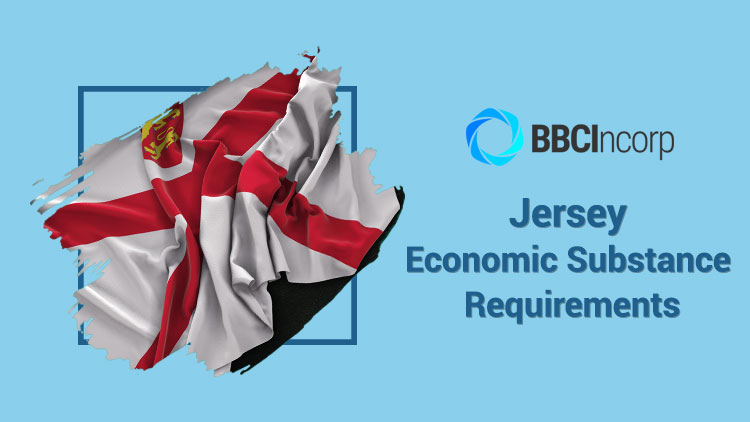
Nestled between England and France, Jersey is a self-governing dependency of the UK. Though it is famous for its beautiful beaches, stunning cliffside walking trails, Jersey has always been a hotspot for offshore incorporation for years.
In this blog, let BBCIncorp give you a comprehensive overview and detailed guide to Jersey Economic Substance.
1. Jersey Economic Substance – a brief intro
In a 2017 screening exercise, the EU’s Code of Conduct Group raised an issue concerning Jersey’s lack of statutory substance rules.
This was considered to leverage the risk that the profits of Jersey tax resident companies might not fully-reflected their activities within this border. Therefore, like any other offshore jurisdiction, Jersey issued a law requiring specific companies to prove that they have sufficient “economic substance” within the country.
Above is the reason why the law was adopted. It is also known as the Taxation (Companies – Economic Substance) (Jersey) Law 2019 (or the ES Law), and is applicable to financial periods commencing on or after the 1st of January 2019.
2. Economic Substance requirements
Before jumping into the requirements of the ES Law of Jersey, you should answer this question: Is your company a tax resident in Jersey?

A company is not a tax resident only if it is centrally managed and controlled anywhere outside of Jersey. Plus, it must be in a country or territory that a company is charged 10% or higher on any part of its income or it is a tax resident in that particular country or territory.
Any other type of companies in Jersey that doesn’t fall into the above categories is considered tax resident in Jersey. There is also one special occasion where a company is listed as a tax resident: a non-Jersey company that is managed and controlled inside of Jersey.
The following matters are the 3 key tests that all business owners need to meet to demonstrate their compliance. Please be noted that this is a guide for companies that already fall into the Economic Substance cases.
First test: Directed and managed inside of Jersey
As per the ES Law, your company (now a relevant company) must be directed and managed inside the borders of Jersey. What it means is that:
- Board of directors meeting in Jersey at adequate times.
- A minimum of directors must be physically present in these meetings, especially when these meetings are labeled as crucial to the company’s business.
- Meeting minutes of such board meetings that include the record of the making of strategic decisions of the company
- All meeting minutes must be kept in Jersey

Even though it is not necessary for all the meetings to be held in Jersey, it is anticipated that the majority of the board meetings will be held within the island with a quorum of directors.
Second test: Demonstrate adequate activity in Jersey
In this second test, relevant companies have to demonstrate adequate activities in Jersey. The activities are listed above:
- Hiring: the company must have an adequate number of employees that are physically present on the island.
- Expenditure: the company must have adequate expenditure in Jersey.
- Assets: the company is obligated to have access to adequate “physical” assets or premises in Jersey.
Important note: the “employees” term is not limited to people who are employed by the company. It also includes people that are deemed to be employees under the Jersey Law such as owner-managers or directors. Plus, any outsourced service provider in Jersey will also be taken into account.
Third test: Conduct core income generator activities (CIGAs) in Jersey
The final test is for the company to check if they conduct CIGAs in Jersey or not. The CIGAs includes:
- Banking business:
- Raising funds, managing risk including credit, currency, and interest risk
- Taking hedging positions
- Providing loans, credit, or other financial services to customers
- Managing capital and preparing reports and returns
- Insurance business:
- Predicting and calculating risk
- Insuring or re-insuring against risk and providing insurance business services to clients
- Management business:
- Taking decisions on the holding and selling of investments
- Calculating risk and reserves
- Taking decisions on currency or interest fluctuations and hedging positions
- Preparing reports and returns
- Leasing business:
- Agreeing to fund terms
- Identifying and acquiring assets to be leased (in the case of leasing)
- Setting the terms and duration of any financing or leasing
- Monitoring and revising any agreements
- Managing any risks
- Headquarters business:
- Taking relevant management decisions
- Incurring expenditures on behalf of group entities
- Co-ordinating group activities
- Shipping business:
- Managing crew (including hiring, paying, and overseeing crew members)
- Overhauling and maintaining ships
- Overseeing and tracking deliveries
- Determining what goods to order and when to deliver them, organizing and overseeing voyages
- Holding company business
- Intellectual property holding business
- The development and subsequent exploitation of the intangible asset generating income:
- Taking strategic decisions
- Managing and bearing the principal risks
- The Acquisition by third parties and subsequent exploitation of and protection of the intangible asset:
- Taking strategic decisions
- Managing and bearing the principal risks
- The generation of revenue from third parties:
- Carrying on the underlying trading activities through which the intangible assets are exploited
- Research and development
- Branding or distribution
- Distribution and service center business
- The Transporting and storing goods, components, and materials
- Stock management
- Orders taking
- Consulting or other administrative services
For the details of each sector, please visit the following Guidance on Jersey Economic Substance.
3. Reporting Economic Substance

After the self-assessment process, the company is obliged to provide information for the Comptroller to determine whether the substance tests have been met. The information listed below is required to be provided by a company in its annual tax return:
- Business type as well as income type to identify the type of CIGAs undertaken
- Confirmation of each CIGAs undertaken (or not undertaken)
- Gross income (typically in the form of the turnover figure from the financial statements) for each CIGAs undertaken
- Detailed amount of operating expenditure by CIGAs
- Details of business address or premises in Jersey
- List of qualified employees
- A financial statement
- A confirmation of CIGAs have been outsourced (if any) as well as its details
- Net book value of the company’s tangible assets
Free ebook
About to start an offshore business? This manual covers all you need to know when going offshore:
- Roadmap to offshore company formation
- How-to guide to offshore bank account registration
- Introduction to international rules in offshore landscapes

4. Penalties for non-compliant company
The Comptroller has a duty to determine whether your company has succeeded or failed the Economic Substance tests for a financial period. If things go south, he/she must issue a notice to your company in order to notify about:
- The penalty decision
- Reasons behind it
- The penalty imposed (can be up to $121,000)
- Suggested actions that your company should take to meet the substance tests
So what will happen to a company that has failed to meet the substance test 2 years in a row? The Comptroller, now, can leverage the fine as well as take measures that may ultimately lead to that company being out of business.
5. Conclusion
Companies in Jersey that are subjected to substance tests should start preparing their required information early to avoid the penalty as per the law.
Should you have any concerns or queries about this matter, our experts are always available to assist. Drop us your questions at service@bbbcincorp.com or visit our Jersey Company Formation to gain more useful information.
Disclaimer: While BBCIncorp strives to make the information on this website as timely and accurate as possible, the information itself is for reference purposes only. You should not substitute the information provided in this article for competent legal advice. Feel free to contact BBCIncorp’s customer services for advice on your specific cases.
Get helpful tips and info from our newsletter!
Stay in the know and be empowered with our strategic how-tos, resources, and guidelines.


